#MEDITERRANEAN TOURISM FOUNDATION
Text
MEDITERRANEAN TOURISM FORUM CELEBRATED in MALTA THE 8TH EDITION: "MEDITERRANEAN LIFE" Low - Impact Investments Favour Everyone. Malta – Hilton Nov 21-23 2023
FORO DE TURISMO MEDITERRÁNEO CELEBRA LA 8ª EDICIÓN en MALTA: “VIDA MEDITERRÁNEA” Las inversiones de bajo impacto benefician a todos Malta-Hilton 21 al 23 de noviembre de 2023
MARÍA E. PAREDES Filántropa, Docente, Comunicadora Social. Pdta. Fijet América, Gte. Divisional SudAmérica.Prensa Especializada
With the presence of important personalities such as HE Dr. George Vella, President of Malta,…

View On WordPress
#21 - 23 de Nov#8ª Edición#CENA DE GALA#FORO DE TURISMO MEDITERRÁNEO#GEORGE VELLA Presidente de Malta#HILTON#lomasleido#lomasvisto#LOW-IMPACT INVESTMENTS FAVOUR EVERYONE#Ma. E. Paredes Fitjet America#MALTA#MARIA E. PAREDES Prensa Especializada#Maria Elena Paredes Turismo#MEDITERRANEAN LIFE#MEDITERRANEAN TOURISM FOUNDATION#MEDITERRANEAN TOURISM GALA AWARDS DINNER#MUNDO
0 notes
Text
Skål International honored to participate in Mediterranean Tourism Forum
Skål International honored to participate in Mediterranean Tourism Forum
The Mediterranean Tourism Foundation (MTF) has honored Skål International World President Burcin Turkkan with an invitation as a speaker at their forthcoming Mediterranean Tourism Forum which will focus on why we need to re-learn how to better use our brains, thinking outside the box is today becoming the moon-shot of our generation.
President Turkkan will join a gathering of leaders of society…

View On WordPress
0 notes
Text
Underwater life at Sa Dragonera Island Marine Reserve in Mallorca (Balearic Islands). Video by Save The Med Foundation.
The sea area around the Sa Dragonera islet is home to a wide diversity of habitats and species in a relatively small space. Like most of the Mediterranean, until recently the biodiversity of this area was endangered. The first critical moment was in the 1970s, with the growth of tourism pressure in the Balearic Islands, when the islets in this area were bought by a company that was going to urbanised them. The local people got organised and did a peaceful occupation of the islets, until they managed to stop the building project, get the island's local government to buy the area and ensure it became a public natural park, and protected as such.
The land was safe, but the biodiversity in the water continued to be endangered. Locals have continued pressuring the government to protect more waters, and each expansion has proven amazing results. Some fish species have shown an increase of 10%, 16%, and even 40% more individuals than before the area was protected.
The last expansion of marine area to be included in the protected area was the "exterior waters" in 2020. In these 3 years, the dusky grouper fish population has grown to be 7 times what it was 3 years ago, brown meagres are 22 times more, and forkbeards are 16 times more (source). The fish species valued as food have triplicated.
All of this has been possible thanks to experts in the field and also local people who are organised in the association Xarxa Dragonera Blava, where everyone takes care of the area from their own sector. All the management and decisions taking processes in relation to this area are done through a participative model with Xarxa Dragonera Blava and all the local community.
These wonderful results give hope around the world, because the marine reserve model works. Particularly in the Mediterranean Sea, with a huge problem of overfishing, it's a model that needs to be applied more widely.
#natura#sa dragonera#reserva marina illa sa dragonera#parc natural de sa dragonera#mallorca#illes balears#biodiversity#animals#sea life#wildlife#wildlife conservation#natural park#travel#mediterranean#sea#europe
32 notes
·
View notes
Photo
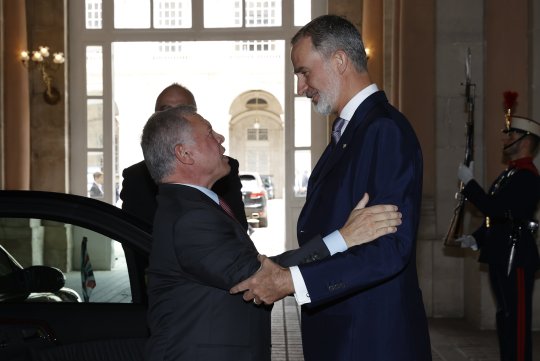

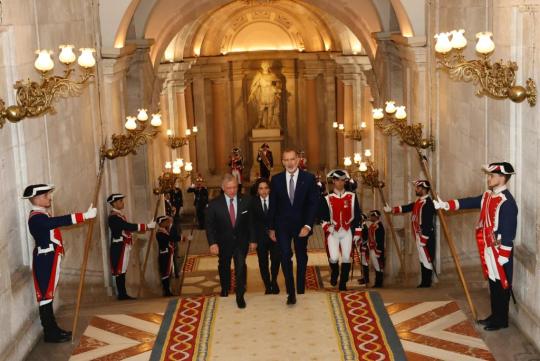
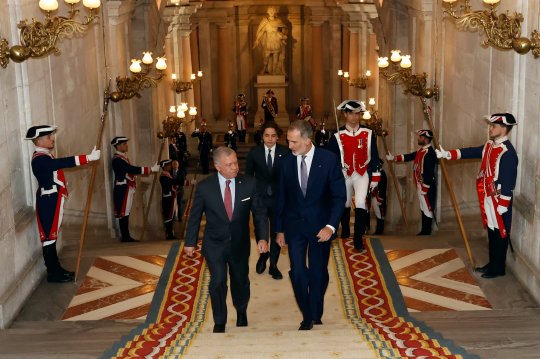
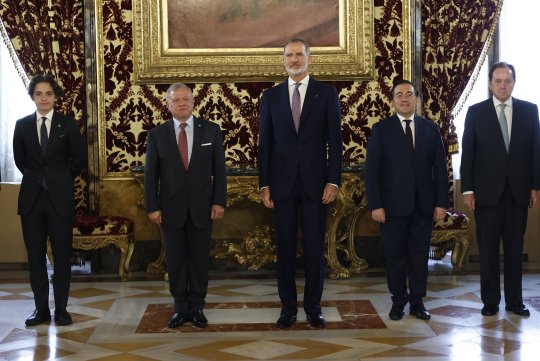
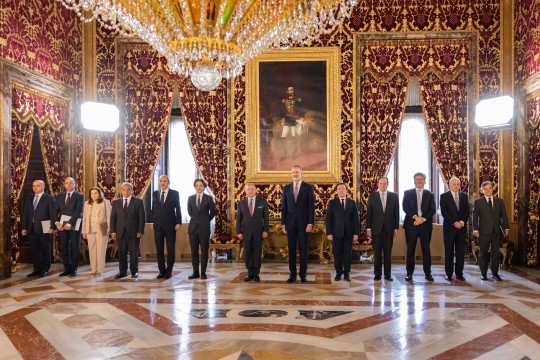




19 June 2023: King Abdullah II reiterated Jordan’s keenness on working with Spain, through its upcoming European Union presidency, to help create a political horizon that would preserve the prospects of just and lasting peace, for the Palestinians and the Israelis.
At a meeting with King Felipe VI of Spain in Madrid, attended by Queen Rania and Queen Letizia, King Abdullah said, “Our joint commitment to peace is evident in supporting the two-state solution as the path forward in resolving the Palestinian-Israeli conflict”.
His Majesty noted in the meeting, attended by Prince Hashem bin Abdullah, that peace on the basis of the two-state solution is key to ensuring peace and prosperity in the entire region, and beyond.
“We will continue working with Spain to resolve the crises facing our wider Euro-Mediterranean region, out of our shared belief that dialogue and cooperation must be the way forward for mutual progress”, the King added. (Source: Petra)
In addition, His Majesty said Jordan and Spain are taking an important step in building partnerships, out of the realisation that “the only way forward is together. We cannot overcome the multitude of challenges facing our world alone”.
The King added that so much has happened in the world over the past eight years since his last visit to Spain, adding that despite crises, conflicts, and the pandemic, the relationship and the warm friendships “between our families, our peoples, and our countries have stayed true, and continued to grow from strength to strength”.
“It is such partnerships that form the foundation of global stability that is much needed for our regions, and our world. And today, this visit is yet another building block in solidifying this relationship, which has continued to grow over the past seven decades,” His Majesty said.
The King highlighted the fruitful talks held with King Felipe VI and President of the Government of Spain Pedro Sánchez, adding that he looks forward to launching a strategic partnership between the two countries.
His Majesty noted that elevating the ties between Jordan and Spain to the strategic level will enable both countries to work more closely on the issues that matter to both peoples and to the world.
In addition, the King said Jordan and Spain are partners in the pursuit of regional and global peace and prosperity, working together to counter the impact of climate change on food and energy security, pointing to a longstanding partnership in the economic, development, and humanitarian spheres.
“We are truly grateful for Spain’s support for our development efforts, and we look to expand our cooperation in education, tourism, cultural exchange, as well as water and energy,” His Majesty said, adding that both countries are equally dedicated to building a more stable world for future generations.
Turning to fighting terrorism, the King underlined that Spain and Jordan have come together to co-organise the latest round of the Aqaba Process meetings, which will take place on Tuesday in Cordoba, noting that he looks forward to fruitful discussions there with friends and partners, on strengthening global coordination in the fight against terrorism and extremism.
His Majesty also congratulated the Spanish Monarch on the anniversary of his coronation.
For his part, King Felipe VI commended the deep-rooted relations between the two countries and peoples, noting that King Abdullah’s visit marks his ninth coronation anniversary.
He underlined the strong ties between Jordan and Spain and their joint aspiration to democratic co-existence, progress and modernity, in addition to their keenness on actively contributing to peace in the region and across the globe.
The Spanish monarch reiterated the centrality of the Palestinian cause in the region, commending Jordan’s continuous efforts to reach just and lasting peace, on the basis of the two-state solution.
King Felipe VI also highlighted the pivotal role of the Hashemite Custodianship of Islamic and Christian holy sites in Jerusalem, which has international and Spanish support.
In addition, he expressed his country’s keenness on enhancing its partnership with Jordan within the Union for the Mediterranean, and through Spain’s rotating presidency of the EU.
King Felipe VI commended Jordan’s efforts in hosting Syrian refugees, as well as Palestinian and Iraqi refugees in the past, highlighting the importance of Jordan’s efforts towards reaching a solution to the Syrian crisis.
Describing Jordan as a centrepiece to a regional balance that is of strategic importance to Spain and Europe, the Spanish monarch highlighted Spain’s keenness on enhancing investment cooperation, especially in the water, renewable energy, and tourism sectors.
He also underlined the importance of elevating relations between the two countries to a strategic level to enhance cooperation in various fields.
Deputy Prime Minister and Foreign Minister Ayman Safadi, Director of the Office of His Majesty Jafar Hassan, Jordan’s Ambassador to Spain Areej Hawamdeh, and a number of senior Spanish officials attended the meeting.
4 notes
·
View notes
Text
Riding the Waves: Italy's Maritime Legal Landscape & Security
Riding the Waves: Italy's Maritime Legal Landscape & Security ===
Italy, with its vast coastline and strategic location in the Mediterranean Sea, has long been a hub for maritime activities. As a nation heavily reliant on maritime trade and tourism, it is crucial for Italy to maintain a strong legal framework for maritime operations and ensure the security of its coastal waters. In this article, we will delve into Italy's maritime legal landscape, explore the challenges it faces in terms of maritime security, and discuss the efforts being made to strengthen and safeguard its coasts.
Riding the Waves: Italy's Maritime Legal Landscape
Italy's maritime legal landscape is built upon a rich history of seafaring traditions and a comprehensive legal framework. The country has ratified numerous international conventions and treaties, including the United Nations Convention on the Law of the Sea (UNCLOS) and the International Maritime Organization (IMO) conventions. These form the foundation of Italy's maritime laws, ensuring compliance with international standards and regulations.
Furthermore, Italy has established its own national legislation, such as the Italian Navigation Code, which governs various aspects of maritime activities, including vessel registration, navigation rights, and safety regulations. This comprehensive legal framework provides a solid foundation for maritime operations in Italian waters.
Understanding Italy's Maritime Security Challenges
Italy faces a variety of maritime security challenges due to its geographical location and the increasing complexity of global security threats. One of the key challenges is irregular migration, with Italy serving as a major entry point for migrants crossing the Mediterranean Sea. This poses significant security and humanitarian challenges, which require effective legal strategies to address.
Additionally, Italy must contend with the threat of maritime crime, including drug trafficking, smuggling, and piracy. These criminal activities not only jeopardize the security of Italian waters but also disrupt international trade and maritime commerce. It is crucial for Italy's legal framework to adapt and respond effectively to these evolving security challenges.
Navigating Italy's Legal Framework for Maritime Operations
Navigating Italy's legal framework for maritime operations requires a firm understanding of the country's national legislation as well as international conventions and treaties. Vessel owners and operators must comply with regulations related to vessel registration, crew requirements, safety equipment, and environmental protection.
Italy also places a strong emphasis on port state control, ensuring that foreign vessels calling at its ports adhere to international standards and regulations. This includes inspections to verify compliance with safety and security measures. By maintaining a robust legal framework, Italy aims to promote safety, security, and environmental sustainability in its maritime operations.
Safeguarding Italy's Coasts: The Role of Maritime Law
Maritime law plays a crucial role in safeguarding Italy's coasts by establishing legal mechanisms to prevent and respond to maritime incidents. Italy has established a specialized maritime police force, the Guardia Costiera, which is responsible for enforcing maritime law, conducting search and rescue operations, and investigating maritime crimes.
Moreover, Italy has implemented measures to enhance the security of its ports and coastal waters, including the use of advanced surveillance technologies, cooperation with other nations, and joint operations with international organizations. By integrating legal and operational efforts, Italy strives to ensure the safety and security of its maritime domain.
Tackling Maritime Crime in Italian Waters: Legal Strategies
To tackle maritime crime in Italian waters, Italy has implemented various legal strategies. The country has established specialized courts with jurisdiction over maritime crimes, ensuring swift and effective legal proceedings. This helps deter criminals and send a strong message that maritime crime will not be tolerated.
Italy also cooperates closely with international partners, sharing intelligence and conducting joint operations to combat maritime crime. This collaboration strengthens Italy's legal strategies by extending their reach beyond national borders. Additionally, Italy actively participates in international initiatives and forums aimed at addressing maritime crime, contributing its expertise and experience to global efforts.
Shaping the Future: Italy's Efforts to Strengthen Maritime Security
Italy recognizes the importance of continuously evolving its legal framework to address emerging maritime security challenges. The country is actively engaged in developing and implementing advanced technologies and systems to enhance maritime surveillance and response capabilities. This includes the use of drones, satellite monitoring, and information-sharing platforms.
Furthermore, Italy is investing in capacity-building initiatives to enhance the skills and capabilities of its maritime law enforcement agencies. Training programs focus on areas such as maritime law, search and rescue operations, and combating maritime crime. These efforts aim to strengthen Italy's ability to respond effectively to maritime security threats and maintain a secure maritime environment.
===
Italy's maritime legal landscape and security measures are crucial for protecting its coasts, ensuring safe and secure maritime operations, and addressing emerging challenges. By maintaining a robust legal framework, implementing effective strategies, and investing in future initiatives, Italy is positioned to navigate the waves of the maritime industry and safeguard its maritime domain. As the country continues to shape the future of maritime security, it remains committed to upholding international standards and collaborating with global partners to create a safer maritime environment for all.
Read the full article
#NavigatingItaly'sLegalFrameworkforMaritimeOperations#RidingtheWaves:Italy'sMaritimeLegalLandscape#RidingtheWaves:Italy'sMaritimeLegalLandscape&Security#SafeguardingItaly'sCoasts:TheRoleofMaritimeLaw#ShapingtheFuture:Italy'sEffortstoStrengthenMaritimeSecurity#TacklingMaritimeCrimeinItalianWaters:LegalStrategies#UnderstandingItaly'sMaritimeSecurityChallenges
0 notes
Text

INTERNATIONAL COUTURE PRESENTS
MEDITERRANEAN SUNSET FASHION SHOW
MAXXI MUSEU M IN ROME ON JULY THE 10th
Fashion, Art and Culture as a vehicle for integration among Mediterranean countries
The “International Couture” is at its 10th edition and p resents The “Mediterranean Sunset” fashion show with the support of Med Or foundation and under the High Patronage of the Embassy of Lebanon in Italy and of Roma Capitale, the Council for major events Sports, Tourism and Fashion.
https://www.fashionluxury.info/en/
0 notes
Text
GBL 2960 Blog Entry 13 - Jan, 15: Gehry yes or Gehry no? Observe the headquarters of the Luma Foundation in Arles and choose a position "for" or "against" the building designed by architect Frank O. Gehry. You must consider the contextual identity of Arles in order to justify your position.
While in Italy and France, for the most part, we had seen many ancient structures with large cultural ties. Roman architecture was quite prevalent as well as massive cathedrals and public spaces. It was an interesting change when we visited the Luma foundation headquarters in Arles, France. This massive modernist structure was a complete 180 from most of what we had already seen and as my structure, the Mucem, the Luma building is a modernist, contemporary building, set against a sea of historical, ancient structures. In some cases, the dynamic works well as old and new come together. In my case, the Mucem serves as a beacon of future progress as the citizens of Marseille use it to understand and connect further with their Mediterranean roots. It stands adjacent to a 12th-century embattlement that citizens have accepted as a bridge between past and present. In the context of the area, the Mucem and the other modernist buildings as part of the Euromediteraneé project work well. On the other hand, I believe the Luma building, although interesting in design and a true feat of engineering, feels out of place in the context of the Arles area. While I am not as well versed in the contextual identity of Arles as I am in with Marseille, from what we had seen and from our tour in the Luma building, Arles seems like a town that has been attempting to modernize but still has much progress to do. It is a town with large historical roots and thus, has many important cultural and ancient buildings in the area. The Luma building seems out of place here because it is on the outskirts of the town and not located near many historic sites, or modernist buildings. In my opinion, the Luma stands on its own with little context behind it. While I love the mission of the Luma foundation and am mesmerized by the architecture of the building, perhaps if the surrounding area was revitalized and built up it would have more context in the area and would “fit in” better. What the Luma does well is connecting with the citizens of Arles by adding identity to the area and bringing in economic revenue through tourism. The building also acts as a landmark, through triangulation. The Luma building is great on its own because it exemplifies “Tectonic” principles as we learned about in class, the idea that a building itself is an art and takes into consideration; form, utility, and design. The Luma building is also useful because it puts the city of Arles on the map and gives a space for local artists to showcase their work. Overall, I am conflicted about the Luma building, while I stand for their mission and appreciate the fantastic contemporary architecture and their use of interesting materials (salt wall by the elevators, etc), I am having trouble with how the building fits in with the context of the area and I think that there would need to be revitalization work done in the area to perhaps give the building more of a “base” within the landscape. In my opinion, Frank Gehry, the architect of the Luma, had a great idea and the execution was perfect, but the location of the building seemed like an afterthought. I would say not Gehry yes or Gehry no, but Gehry kinda.
0 notes
Text
Sunday, October 30, 2022
Be careful on Halloween
(WSJ) Halloween is the most dangerous night of the year for pedestrians. The risk of death increases 43% compared to other nights in the US, according to one study, as costume-clad children and their parents crisscross streets after dark. Making matters worse, this year’s holiday comes at a time when the US is facing record traffic casualties, with pedestrian fatalities at their highest in 40 years.
Pelosi attack shocks country
(AP) An America that can already feel like it’s hurtling toward political disintegration has been jolted yet again, this time by the violent attack on the husband of House Speaker Nancy Pelosi less than two weeks before Election Day. Seizing a hammer and leaving a trail of broken glass, an intruder broke into the couple’s San Francisco home early Friday and repeatedly struck Paul Pelosi, 82. He had surgery to repair a skull fracture and serious injuries to his right arm and hands, and his doctors expect a full recovery, the speaker’s office said. The assailant confronted Paul Pelosi by shouting, “Where is Nancy,” according to another person familiar with the situation. The calling out of her name was a sign that the assault could have targeted the lawmaker, who as speaker is second in line to the presidency.
Cholera overwhelms Haiti as cases, deaths spike amid crisis
(AP) The sun shone down on Stanley Joliva as medical staff at an open-air clinic hovered around him, pumping air into his lungs and giving him chest compressions until he died. Nearby, his mother watched. “Only God knows my pain,” said Viliene Enfant. Less than an hour later, the body of her 22-year-old son lay on the floor wrapped in a white plastic bag with the date of his death scrawled on top. He joined dozens of other Haitians who have died from cholera during a rapidly spreading outbreak that is straining the resources of nonprofits and local hospitals in a country where fuel, water and other basic supplies are growing scarcer by the day. Across Haiti, many patients are dying because say they’re unable to reach a hospital in time, health officials say. A spike in gang violence has made it unsafe for people to leave their communities and a lack of fuel has shut down public transportation, gas stations and other key businesses including water supply companies.
The cannibal vs. the Satanist: Toxic politics is poisoning Brazil
(Washington Post) From the Amazon jungle to the megacities of the southeast, Brazil’s political division is upending churches, making targets of pollsters and igniting feuds between strangers, friends, family, even branches of government, all while pitting region against region and opening fresh rifts over sexuality, religion and race. More than anything, however, the Brazilian contest is a sign of a new normal in democratic elections, where debates over budgets and spending have been replaced by bitter culture wars, assaults on electoral systems and skepticism about democracy itself. Bolsonaro and his camp have accused Lula of being a closet communist, and a Satanist who wants to shutter churches and create unisex bathrooms in public schools. One of Lula’s campaign ads, meanwhile, latched on to an old boast—and apparent joke—of Bolsonaro’s to suggest he practices cannibalism. The left here is portraying Bolsonaro as a fascist dictator in the making, and calling his defeat essential to the future of Brazilian democracy. (Each side denies the other’s claims as absurd.) “It’s the Americanization of Brazilian politics,” said Guilherme Casarões, a political analyst at the Getulio Vargas Foundation in São Paulo.
Ahead of harsh winter, tourism roars back in Mediterranean
(AP) Tourism around the Mediterranean has been booming. Helped by a strong U.S. dollar and Europeans’ pent-up demand to find a beach after years of COVID-19 travel restrictions, it’s been a stronger comeback from the pandemic slump than many expected, which led to long lines, canceled flights and lost luggage this summer at many European airports—though not in Greece. Greece is on course to beat its annual record revenue haul from tourism. Portugal also is eyeing a full recovery, while late-summer data suggested Spain, Italy and Cyprus will end the year just shy of pre-pandemic visitor levels. A blessing for Europe’s southern economies, the rebound is also easing the continent’s tilt toward recession brought on by rocketing energy prices, the war in Ukraine and enduring disruptions caused by the pandemic.
The Slog of Mud Season in Ukraine
(NYT) Ukrainian forces advanced on the Russian-occupied city of Kherson in the south on Friday, and the two sides battled over smaller cities in the east, as the armies fought not only each other but also a thick clay muck that can swallow vehicles’ wheels and soldiers’ boots whole. It is the muddy season, called “bezdorizhzhya” in Ukrainian and “rasputitsa” in Russian. In any language it turns warfare—especially offensive operations—into a slow, arduous slog, exposing troops and equipment to enemy fire. In the southern Kherson region, a largely agricultural area where wide-open plains are crisscrossed with irrigation canals, the chilly, wet weather is making conditions particularly difficult, slowing Ukraine’s offensive. Ill-prepared Russian troops are suffering from “the lack of warm clothes,” Ukraine’s military command said in a statement on Friday, leading to “widespread theft and looting.” Muddy season strikes twice a year in many rural areas of Eastern Europe, with the spring thaw and again with autumn rains, before the winter freeze. Where roads are unpaved, it can be immobilizing. The same conditions hampered Napoleon’s invasion of Russia in 1812, Hitler’s invasion of the Soviet Union in 1941 and the Russian invasion of Ukraine early this year.
Scarred by War, Ukraine’s Children Face Years of Trauma
(NYT) Using his small blue crutches, Daniil Avdieienko, 7, gestured toward two deep brown stains on the cement floor of the entryway to his apartment building. The patch on the right, just inside the door, was his blood, he explained. Then he pointed at the other blood stain: “This is from my mother.” Daniil and his parents were running to a basement shelter in central Chernihiv, a northern city where fighting raged in the early days of the war, when shrapnel struck him in the back. Eventually, he had to have 60 centimeters, or nearly two feet, of his intestines removed. Seven months later he is still recovering from his wounds, and will likely need several more surgeries, as will his parents, both of whom suffered serious leg injuries. But while his physical injuries are on the mend, he is still grappling with the psychological trauma of the attack. The conflict in Ukraine has brought pain and hardship to tens of thousands of civilians, but among the more wrenching consequences is its effect on a generation of children like Daniil who will be confronting physical and psychological pain, many for the rest of their lives.
Chinese roulette
(AP/NYT) China’s largest city of Shanghai is ordering mass testing Friday on all 1.3 million residents of its downtown Yangpu district and confining them to their homes at least until results are known. The demand is an echo of measures ordered over the summer that led to a two-month lockdown of the entire city of 25 million that devastated the local economy, prompting food shortages and rare confrontations between residents and the authorities. A business executive in Shenzhen to whom I spoke called day-to-day life the “Chinese roulette.” You never know when your residential compound will be locked down for one infection. You never know whether you will be allowed to order grocery delivery or left hungry. You never know whether you will be allowed to go to the hospital when you’re sick with illnesses other than Covid. You never know whether you will be sent to a quarantine camp. All in the name of protecting your health.
Crush kills at least 146 at Halloween festivities in Seoul
(AP) A mass of mostly young people celebrating Halloween festivities in Seoul became trapped and crushed as the crowd surged into a narrow alley, killing at least 146 people and injuring 150 others in South Korea’s worst disaster in years. Emergency workers and pedestrians desperately performed CPR on people lying in the streets after the crush in the capital’s leisure district of Itaewon Saturday night. Choi Seong-beom, chief of Seoul’s Yongsan fire department, said the death toll could rise further and that an unspecified number among the injured were in critical condition.
UN: 2022 likely deadliest for Palestinians in West Bank
(AP) The U.N. Mideast envoy said 2022 is on course to be the deadliest year for Palestinians in the West Bank since the U.N. started tracking fatalities in 2005, and he called for immediate action to calm “an explosive situation” and move toward renewing Israeli-Palestinian negotiations. Tor Wennesland told the U.N. Security Council that “mounting hopelessness, anger and tension have once again erupted into a deadly cycle of violence that is increasingly difficult to contain,” and “too many people, overwhelmingly Palestinian have been killed and injured.” In a grim assessment, the special coordinator for the Middle East peace process said the downward spiral in the West Bank and current volatile situation stem from decades of violence that has taken a toll on Israelis and Palestinians, the prolonged absence of negotiations, and the failure to resolve key issues fueling the Israel-Palestinian conflict.
Renewed clashes in east Congo send residents fleeing
(AP) Renewed clashes between government soldiers and M23 rebels in eastern Congo forced more people from their homes Friday, deepening a crisis that the U.N. says already displaced 40,000 in a week’s time. The clashes that started at around 5 a.m. sent panic-stricken residents fleeing the towns of Rugari, Kalengera and Kabaya. Some headed for Kanyaruchinya near Goma, where many displaced people have gone since fighting between the two sides resumed on Oct. 20. Aline Semasanga and her family fled to Rumangabo without taking anything with them. “We waited for bullets fired by the military,” she told The Associated Press. “We were very worried and afraid. Some died and others ended up with us here because God protected us. We ask our government to bring us peace so that we can return home.”
The Rising Tide of Global Sadness
(David Brooks, NYT) Taylor Swift was quite the romantic when she burst on the scene in 2006. She sang about the ecstasies of young love and the heartbreak of it. But her mood has hardened as her star has risen. Her excellent new album, “Midnights,” plays upon a string of negative emotions—anxiety, restlessness, exhaustion and occasionally anger. It turns out Swift is part of a larger trend. The researchers Charlotte Brand, Alberto Acerbi and Alex Mesoudi analyzed more than 150,000 pop songs released between 1965 and 2015. Over that time, the appearance of the word “love” in top-100 hits roughly halved. Meanwhile, the number of times such songs contained negative emotion words, like “hate” rose sharply.
Pop music isn’t the only thing that has gotten a lot harsher. David Rozado, Ruth Hughes and Jamin Halberstadt analyzed 23 million headlines published between 2000 and 2019 by 47 news outlets popular in the United States. The headlines, too, grew significantly more negative, with a greater proportion of headlines denoting anger, fear, disgust and sadness. Headlines in left-leaning media got a lot more negative, and headlines in right-leaning publications got even more negative than that.
The negativity in the culture reflects the negativity in real life. The General Social Survey asks people to rate their happiness levels. Between 1990 and 2018 the share of Americans who put themselves in the lowest happiness category increased by more than 50 percent. And that was before the pandemic. The really bad news is abroad. Each year Gallup surveys roughly 150,000 people in over 140 countries about their emotional lives. Experiences of negative emotions—related to stress, sadness, anger, worry and physical pain—hit a record high last year.
1 note
·
View note
Text
Tourism Minister Honoured - DailyGuide Network
Tourism Minister Honoured – DailyGuide Network
Dr. Ibrahim Mohammed Awal
The Minister of Tourism, Arts and Culture, Dr. Ibrahim Mohammed Awal, has been honoured by the Mediterranean Tourism Foundation for spearheading an innovative tourism drive in Ghana and Africa.
The recognition, in the form of an award, the first of its kind to be presented to a Minister from Sub-Saharan Africa, was also an acknowledgement of Dr. Awal’s efforts at…
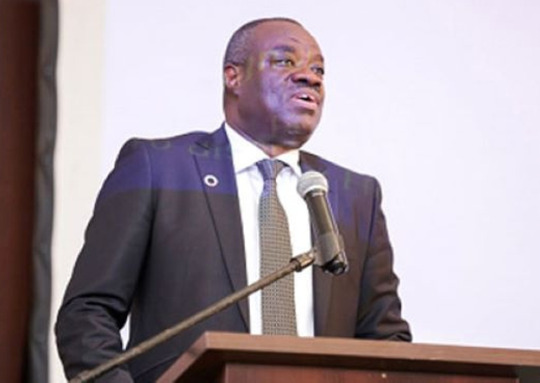
View On WordPress
0 notes
Text
THE MEDITERRANEAN ORCHESTRA, The Instrumento for peace🎶
LA ORQUESTA MEDITERRÁNEA, EL INSTRUMENTO PARA LA PAZ🎶
MARÍA E. PAREDES Filántropa, Docente, Comunicadora Social. Gte. Divisional SudAmérica.Prensa Especializada
The Mediterranean Orchestra makes a timely return with Andrew Agius Muscat, Secretary General of the Mediterranean Tourism Foundation (MTF), unveiling “The Best Movie Soundtracks Vol. 3 – Classic” on the global stage. This…
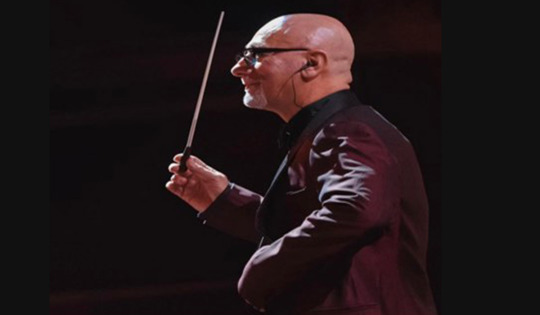
View On WordPress
#ANDREW AGIUS MUSCAT#BRUNO SANTORI#Filantropa#lomasleido#lomasvisto#MARIA E PAREDES#MUSICA#THE BEST MOVIE SOUNDTRACK#THE MEDITERRANEAN ORCHESTRA#XPLORALYA
0 notes
Text
Rami Beracha to Launch Pioneering Dubai Investment Fund
Israeli investor and entrepreneur Rami Beracha is on his way to opening a new investment fund in the United Arab Emirates. Beracha, who worked for years at the Pitango Venture Capital fund, which recorded over eighty exits worth about two billion dollars during his time, is in advanced talks with banks and financial institutions in the UAE to launch the fund.
Israeli venture capitalist Rami Beracha, who worked for the Pitango Investment Fund for over twenty years, is currently initiating the establishment of a new international venture capital investment fund in the United Arab Emirates called Ender Ventures.
The new investment fund aims to connect companies and local entrepreneurs, create a global renewal center in the Persian Gulf state, and position the UAE as a center of excellence. The goals and aspirations of the investment fund, according to Calcalist, are to invest in cyber and advanced technology in the fields of artificial intelligence, quantum computing, virtual reality and cloud infrastructure, robots, skimmers, image processing, sensors, and more.
Rami Beracha hopes to build on past investment success
Beracha has built a successful investment portfolio in communication technology did not come to the world of venture capital investments from the world of finance or technology, but rather from law school.
Beracha began his studies in Tel Aviv, continued in New York, and then did a master's degree in business administration at INSEAD University in France. With a different and refreshing background in the venture capital landscape, Beracha joined the Pitango Fund in 1996, after a stint on Wall Street.
He began his career at the firm as an employee, and in 2000, he became a partner. Most of the investments that Beracha made during his years in the fund were in the field of communications - with an emphasis on the field of chips. Now, he is set to be one of the first Israeli investors in the UAE, in what appears to be another economic move led on par with groundbreaking moves in the past.
Peace agreement opens new economic corridor between Israel and UAE
When it comes to economic investment in the UAE in general and Dubai in particular, it seems that Israel and its investment pioneers, like Rami Beracha, are about to enter a well-oiled machine that works well, and according to experts' forecasts, should continue to grow and develop in the coming years. It is the emerging economy of the UAE that has made the country an attractive destination for investors from all over the world.
The "Abraham Accords," the recently signed peace agreement between Israel and the United Arab Emirates, opened a window to many economic possibilities for Israeli investors in the country and lay the foundations for the establishment of extensive economic ties between the countries.
Israeli investors are entering a large, powerful, attractive and efficient market. The UAE and Dubai attract many investors from all over the world to the Gulf principalities. The areas of investment in the country are many and varied - from real estate through tourism to technology.
Photo credit: Freepik
Dubai: Playground for foreign investors
The "Desert Jewel", as many call Dubai, is an innovative and even futuristic city adorned with tall buildings, including the tallest tower in the world - Burj Khalifa, that offers many attractions, luxury shopping, festivals, and popular and well-known sporting events like Formula 1.
The pearl of the UAE attracts many investors from all over the world, and across the UAE itself. The country offers economic benefits to attract foreign investors including a law that allows 100% foreign ownership of companies and the issuance of a ten-year residence visa to foreign investors.
According to data from the World Bank, GDP at current prices in the UAE has risen by about 45% in the last decade. The UAE is ranked 11th in the world according to the Ease of Doing Business report for 2019 and first place in the Mediterranean region.
Additionally, the UAE has adopted a policy of bureaucratic relief, certainly compared to Western European and US countries, to attract foreign investors. Taxation in the Gulf state is also very attractive, allowing investors outside the country to enjoy full tax exemption on profits and investments, an exceptional benefit in relation to leading markets in Europe and the US.
Beracha’s powerful investment record
Beracha, who lost his left leg and right hand when he stepped on a mine in Lebanon during the first Lebanon war in 1983, has not let the severe injury stop him from pursuing difficult and demanding sports like sailing and kitesurfing or excelling in his professional life. He has invested a lot of time, energy and resources to support organizations that accompany and assist the wounded and disabled in the IDF.
He accelerated through the ranks of the Pitango Fund, which was crowned the largest venture capital fund in Israel in 2009, to become one of the fund's partners. He was chosen as the ‘Esteemed Partner’ for 2011 in a survey conducted among entrepreneurs and managers of start-up companies in Israel on the Globes website.
Among the most successful and prominent exit deals achieved by Beracha include the sale of Convergin to Oracle for $80 million, the sale of Dion Networks to Broadcom for $180 million, and the sale of MobileAccess to Corning Incorporated worth $ 180 million.
Rami Beracha has been working as a private investor in start-up companies since 2018. The investment funds he managed during his activity recorded returns of twenty percent per year and a threefold return on investment.
Beracha currently serves as chairman of SOSA, which provides innovative models for advanced technological solutions at two global high-tech centers, New York and Tel Aviv.
Source:
https://www.jpost.com/special-content/rami-beracha-to-launch-pioneering-dubai-investment-fund-660689
rami beracha
https://www.yoav.org.il/objDoc.asp?PID=474647&OID=474649&DivID=128&oAcl=0
https://il.linkedin.com/in/%D7%A8%D7%9E%D7%99-%D7%91%D7%A8%D7%9B%D7%94
rami beracha
https://www.d.co.il/80180200/26760/
rami beracha
rami beracha
https://www.israelhayom.co.il/article/854225
rami beracha
0 notes
Text
Rami Beracha to Launch Pioneering Dubai Investment Fund
Israeli investor and entrepreneur Rami Beracha is on his way to opening a new investment fund in the United Arab Emirates. Beracha, who worked for years at the Pitango Venture Capital fund, which recorded over eighty exits worth about two billion dollars during his time, is in advanced talks with banks and financial institutions in the UAE to launch the fund.
Israeli venture capitalist Rami Beracha, who worked for the Pitango Investment Fund for over twenty years, is currently initiating the establishment of a new international venture capital investment fund in the United Arab Emirates called Ender Ventures.
The new investment fund aims to connect companies and local entrepreneurs, create a global renewal center in the Persian Gulf state, and position the UAE as a center of excellence. The goals and aspirations of the investment fund, according to Calcalist, are to invest in cyber and advanced technology in the fields of artificial intelligence, quantum computing, virtual reality and cloud infrastructure, robots, skimmers, image processing, sensors, and more.
Rami Beracha hopes to build on past investment success
Beracha has built a successful investment portfolio in communication technology did not come to the world of venture capital investments from the world of finance or technology, but rather from law school.
Beracha began his studies in Tel Aviv, continued in New York, and then did a master's degree in business administration at INSEAD University in France. With a different and refreshing background in the venture capital landscape, Beracha joined the Pitango Fund in 1996, after a stint on Wall Street.
He began his career at the firm as an employee, and in 2000, he became a partner. Most of the investments that Beracha made during his years in the fund were in the field of communications - with an emphasis on the field of chips. Now, he is set to be one of the first Israeli investors in the UAE, in what appears to be another economic move led on par with groundbreaking moves in the past.
Peace agreement opens new economic corridor between Israel and UAE
When it comes to economic investment in the UAE in general and Dubai in particular, it seems that Israel and its investment pioneers, like Rami Beracha, are about to enter a well-oiled machine that works well, and according to experts' forecasts, should continue to grow and develop in the coming years. It is the emerging economy of the UAE that has made the country an attractive destination for investors from all over the world.
The "Abraham Accords," the recently signed peace agreement between Israel and the United Arab Emirates, opened a window to many economic possibilities for Israeli investors in the country and lay the foundations for the establishment of extensive economic ties between the countries.
Israeli investors are entering a large, powerful, attractive and efficient market. The UAE and Dubai attract many investors from all over the world to the Gulf principalities. The areas of investment in the country are many and varied - from real estate through tourism to technology.
Photo credit: Freepik
Dubai: Playground for foreign investors
The "Desert Jewel", as many call Dubai, is an innovative and even futuristic city adorned with tall buildings, including the tallest tower in the world - Burj Khalifa, that offers many attractions, luxury shopping, festivals, and popular and well-known sporting events like Formula 1.
The pearl of the UAE attracts many investors from all over the world, and across the UAE itself. The country offers economic benefits to attract foreign investors including a law that allows 100% foreign ownership of companies and the issuance of a ten-year residence visa to foreign investors.
According to data from the World Bank, GDP at current prices in the UAE has risen by about 45% in the last decade. The UAE is ranked 11th in the world according to the Ease of Doing Business report for 2019 and first place in the Mediterranean region.
Additionally, the UAE has adopted a policy of bureaucratic relief, certainly compared to Western European and US countries, to attract foreign investors. Taxation in the Gulf state is also very attractive, allowing investors outside the country to enjoy full tax exemption on profits and investments, an exceptional benefit in relation to leading markets in Europe and the US.
Beracha’s powerful investment record
Beracha, who lost his left leg and right hand when he stepped on a mine in Lebanon during the first Lebanon war in 1983, has not let the severe injury stop him from pursuing difficult and demanding sports like sailing and kitesurfing or excelling in his professional life. He has invested a lot of time, energy and resources to support organizations that accompany and assist the wounded and disabled in the IDF.
He accelerated through the ranks of the Pitango Fund, which was crowned the largest venture capital fund in Israel in 2009, to become one of the fund's partners. He was chosen as the ‘Esteemed Partner’ for 2011 in a survey conducted among entrepreneurs and managers of start-up companies in Israel on the Globes website.
Among the most successful and prominent exit deals achieved by Beracha include the sale of Convergin to Oracle for $80 million, the sale of Dion Networks to Broadcom for $180 million, and the sale of MobileAccess to Corning Incorporated worth $ 180 million.
Rami Beracha has been working as a private investor in start-up companies since 2018. The investment funds he managed during his activity recorded returns of twenty percent per year and a threefold return on investment.
Beracha currently serves as chairman of SOSA, which provides innovative models for advanced technological solutions at two global high-tech centers, New York and Tel Aviv.
Source:
https://www.jpost.com/special-content/rami-beracha-to-launch-pioneering-dubai-investment-fund-660689
rami beracha
רמי ברכה
rami beracha
rami beracha
רמי ברכה
rami beracha
https://13tv.co.il/item/special/advertorial/hgy75-902565792/
rami beracha
0 notes
Text
Rami Beracha to Launch Pioneering Dubai Investment Fund
Israeli investor and entrepreneur Rami Beracha is on his way to opening a new investment fund in the United Arab Emirates. Beracha, who worked for years at the Pitango Venture Capital fund, which recorded over eighty exits worth about two billion dollars during his time, is in advanced talks with banks and financial institutions in the UAE to launch the fund.
Israeli venture capitalist Rami Beracha, who worked for the Pitango Investment Fund for over twenty years, is currently initiating the establishment of a new international venture capital investment fund in the United Arab Emirates called Ender Ventures.
The new investment fund aims to connect companies and local entrepreneurs, create a global renewal center in the Persian Gulf state, and position the UAE as a center of excellence. The goals and aspirations of the investment fund, according to Calcalist, are to invest in cyber and advanced technology in the fields of artificial intelligence, quantum computing, virtual reality and cloud infrastructure, robots, skimmers, image processing, sensors, and more.
Rami Beracha hopes to build on past investment success
Beracha has built a successful investment portfolio in communication technology did not come to the world of venture capital investments from the world of finance or technology, but rather from law school.
Beracha began his studies in Tel Aviv, continued in New York, and then did a master's degree in business administration at INSEAD University in France. With a different and refreshing background in the venture capital landscape, Beracha joined the Pitango Fund in 1996, after a stint on Wall Street.
He began his career at the firm as an employee, and in 2000, he became a partner. Most of the investments that Beracha made during his years in the fund were in the field of communications - with an emphasis on the field of chips. Now, he is set to be one of the first Israeli investors in the UAE, in what appears to be another economic move led on par with groundbreaking moves in the past.
Peace agreement opens new economic corridor between Israel and UAE
When it comes to economic investment in the UAE in general and Dubai in particular, it seems that Israel and its investment pioneers, like Rami Beracha, are about to enter a well-oiled machine that works well, and according to experts' forecasts, should continue to grow and develop in the coming years. It is the emerging economy of the UAE that has made the country an attractive destination for investors from all over the world.
The "Abraham Accords," the recently signed peace agreement between Israel and the United Arab Emirates, opened a window to many economic possibilities for Israeli investors in the country and lay the foundations for the establishment of extensive economic ties between the countries.
Israeli investors are entering a large, powerful, attractive and efficient market. The UAE and Dubai attract many investors from all over the world to the Gulf principalities. The areas of investment in the country are many and varied - from real estate through tourism to technology.
Photo credit: Freepik
Dubai: Playground for foreign investors
The "Desert Jewel", as many call Dubai, is an innovative and even futuristic city adorned with tall buildings, including the tallest tower in the world - Burj Khalifa, that offers many attractions, luxury shopping, festivals, and popular and well-known sporting events like Formula 1.
The pearl of the UAE attracts many investors from all over the world, and across the UAE itself. The country offers economic benefits to attract foreign investors including a law that allows 100% foreign ownership of companies and the issuance of a ten-year residence visa to foreign investors.
According to data from the World Bank, GDP at current prices in the UAE has risen by about 45% in the last decade. The UAE is ranked 11th in the world according to the Ease of Doing Business report for 2019 and first place in the Mediterranean region.
Additionally, the UAE has adopted a policy of bureaucratic relief, certainly compared to Western European and US countries, to attract foreign investors. Taxation in the Gulf state is also very attractive, allowing investors outside the country to enjoy full tax exemption on profits and investments, an exceptional benefit in relation to leading markets in Europe and the US.
Beracha’s powerful investment record
Beracha, who lost his left leg and right hand when he stepped on a mine in Lebanon during the first Lebanon war in 1983, has not let the severe injury stop him from pursuing difficult and demanding sports like sailing and kitesurfing or excelling in his professional life. He has invested a lot of time, energy and resources to support organizations that accompany and assist the wounded and disabled in the IDF.
He accelerated through the ranks of the Pitango Fund, which was crowned the largest venture capital fund in Israel in 2009, to become one of the fund's partners. He was chosen as the ‘Esteemed Partner’ for 2011 in a survey conducted among entrepreneurs and managers of start-up companies in Israel on the Globes website.
Among the most successful and prominent exit deals achieved by Beracha include the sale of Convergin to Oracle for $80 million, the sale of Dion Networks to Broadcom for $180 million, and the sale of MobileAccess to Corning Incorporated worth $ 180 million.
Rami Beracha has been working as a private investor in start-up companies since 2018. The investment funds he managed during his activity recorded returns of twenty percent per year and a threefold return on investment.
Beracha currently serves as chairman of SOSA, which provides innovative models for advanced technological solutions at two global high-tech centers, New York and Tel Aviv.
Source:
https://www.jpost.com/special-content/rami-beracha-to-launch-pioneering-dubai-investment-fund-660689
rami beracha
rami beracha
רמי ברכה
rami beracha
רמי ברכה
rami beracha
0 notes
Text
Rami Beracha to Launch Pioneering Dubai Investment Fund
Israeli investor and entrepreneur Rami Beracha is on his way to opening a new investment fund in the United Arab Emirates. Beracha, who worked for years at the Pitango Venture Capital fund, which recorded over eighty exits worth about two billion dollars during his time, is in advanced talks with banks and financial institutions in the UAE to launch the fund.
Israeli venture capitalist Rami Beracha, who worked for the Pitango Investment Fund for over twenty years, is currently initiating the establishment of a new international venture capital investment fund in the United Arab Emirates called Ender Ventures.
The new investment fund aims to connect companies and local entrepreneurs, create a global renewal center in the Persian Gulf state, and position the UAE as a center of excellence. The goals and aspirations of the investment fund, according to Calcalist, are to invest in cyber and advanced technology in the fields of artificial intelligence, quantum computing, virtual reality and cloud infrastructure, robots, skimmers, image processing, sensors, and more.
Rami Beracha hopes to build on past investment success
Beracha has built a successful investment portfolio in communication technology did not come to the world of venture capital investments from the world of finance or technology, but rather from law school.
Beracha began his studies in Tel Aviv, continued in New York, and then did a master's degree in business administration at INSEAD University in France. With a different and refreshing background in the venture capital landscape, Beracha joined the Pitango Fund in 1996, after a stint on Wall Street.
He began his career at the firm as an employee, and in 2000, he became a partner. Most of the investments that Beracha made during his years in the fund were in the field of communications - with an emphasis on the field of chips. Now, he is set to be one of the first Israeli investors in the UAE, in what appears to be another economic move led on par with groundbreaking moves in the past.
Peace agreement opens new economic corridor between Israel and UAE
When it comes to economic investment in the UAE in general and Dubai in particular, it seems that Israel and its investment pioneers, like Rami Beracha, are about to enter a well-oiled machine that works well, and according to experts' forecasts, should continue to grow and develop in the coming years. It is the emerging economy of the UAE that has made the country an attractive destination for investors from all over the world.
The "Abraham Accords," the recently signed peace agreement between Israel and the United Arab Emirates, opened a window to many economic possibilities for Israeli investors in the country and lay the foundations for the establishment of extensive economic ties between the countries.
Israeli investors are entering a large, powerful, attractive and efficient market. The UAE and Dubai attract many investors from all over the world to the Gulf principalities. The areas of investment in the country are many and varied - from real estate through tourism to technology.
Photo credit: Freepik
Dubai: Playground for foreign investors
The "Desert Jewel", as many call Dubai, is an innovative and even futuristic city adorned with tall buildings, including the tallest tower in the world - Burj Khalifa, that offers many attractions, luxury shopping, festivals, and popular and well-known sporting events like Formula 1.
The pearl of the UAE attracts many investors from all over the world, and across the UAE itself. The country offers economic benefits to attract foreign investors including a law that allows 100% foreign ownership of companies and the issuance of a ten-year residence visa to foreign investors.
According to data from the World Bank, GDP at current prices in the UAE has risen by about 45% in the last decade. The UAE is ranked 11th in the world according to the Ease of Doing Business report for 2019 and first place in the Mediterranean region.
Additionally, the UAE has adopted a policy of bureaucratic relief, certainly compared to Western European and US countries, to attract foreign investors. Taxation in the Gulf state is also very attractive, allowing investors outside the country to enjoy full tax exemption on profits and investments, an exceptional benefit in relation to leading markets in Europe and the US.
Beracha’s powerful investment record
Beracha, who lost his left leg and right hand when he stepped on a mine in Lebanon during the first Lebanon war in 1983, has not let the severe injury stop him from pursuing difficult and demanding sports like sailing and kitesurfing or excelling in his professional life. He has invested a lot of time, energy and resources to support organizations that accompany and assist the wounded and disabled in the IDF.
He accelerated through the ranks of the Pitango Fund, which was crowned the largest venture capital fund in Israel in 2009, to become one of the fund's partners. He was chosen as the ‘Esteemed Partner’ for 2011 in a survey conducted among entrepreneurs and managers of start-up companies in Israel on the Globes website.
Among the most successful and prominent exit deals achieved by Beracha include the sale of Convergin to Oracle for $80 million, the sale of Dion Networks to Broadcom for $180 million, and the sale of MobileAccess to Corning Incorporated worth $ 180 million.
Rami Beracha has been working as a private investor in start-up companies since 2018. The investment funds he managed during his activity recorded returns of twenty percent per year and a threefold return on investment.
Beracha currently serves as chairman of SOSA, which provides innovative models for advanced technological solutions at two global high-tech centers, New York and Tel Aviv.
Source:
https://www.jpost.com/special-content/rami-beracha-to-launch-pioneering-dubai-investment-fund-660689
rami beracha
רמי ברכה
rami beracha
רמי ברכה
rami beracha
רמי ברכה
1 note
·
View note
Photo

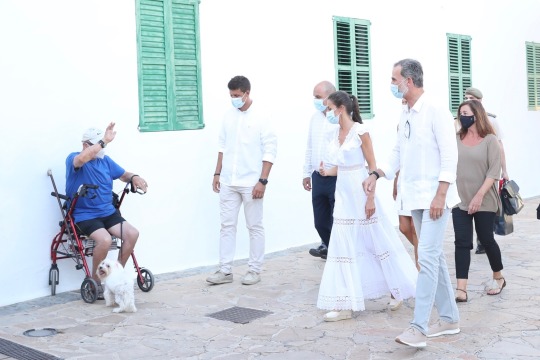
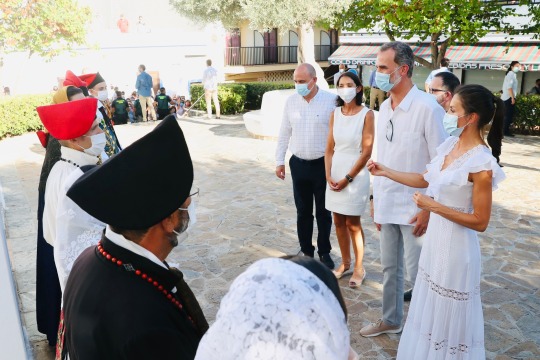
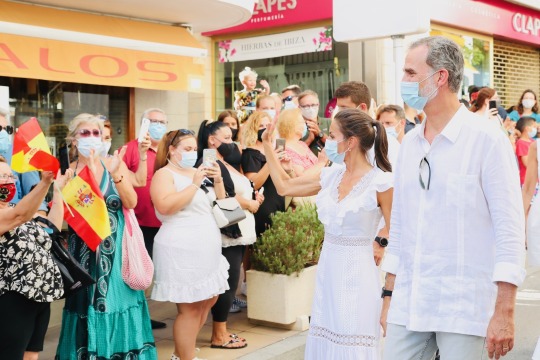
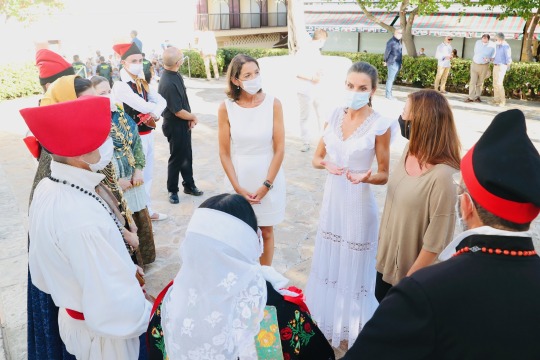

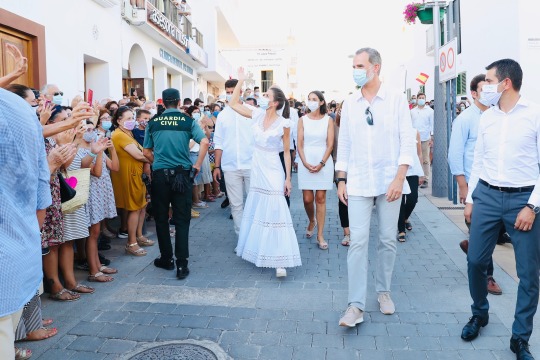



August 17, 2020: King Felipe and Queen Letizia visited the Island of Ibiza. They visited the Puig des Molins Monographic Museum/Necropolis and took a walk through the old town and Paseo de la Mar in the town of Sant Antoni de Portmany.
Don Felipe and Doña Letizia they arrived at the Puig des Molins Necropolis and Monographic Museum in Eivissa, accompanied by the president of the Balearic Islands, Francina Armengol; the Minister of Industry, Commerce and Tourism, Reyes Maroto; and by a delegate of the Government in the Autonomous Community of the Balearic Islands, Ana María Calvo and they were received by the president of the Ibiza Island Council, Vicent Marí Torres; the first deputy mayor, councilor for Urbanism, Public Roads and Sports of the Ibiza Town Hall, Elena López; the Ministry of the Presidency, Culture and Equality of the Government of the Balearic Islands, Pilar Costa; and by the deputy director and curator of the Puig des Molins Museum, María Bofill.
Next, they were able to see a general presentation of the museum in front of a model and through an audiovisual presentation and began the visit outside, in the Phoenician-Punic burial chambers of the hypogeum of La Mula, and from a viewpoint they observed the necropolis. Inside, Don Felipe and Doña Letizia toured the different rooms, in which important archaeological remains of funeral, Phoenician, Punic and Roman-era rituals are preserved and exhibited.
Puig des Moulins is the best preserved necropolis in the Mediterranean, and the largest and best preserved in the world. Home of the goddess Tania, it was the cemetery of the Cities of Ibiza during the entire period of antiquity.
It is located about 500 meters west of Puig de Vila, in the same place where the city has been located since its foundation by Phoenicians at the end of the 7th century BC Its name derives from the windmills that dominated its summit from at least the fifteenth century, currently in disuse, and of which today only some of them remain. The poet Rafael Alberti and his wife Mª Teresa León lived in one of these mills during their stay on the island in July 1936, just when the Spanish Civil War broke out.
The initial cemetery, established at the end of the 7th century BC by the Phoenicians, occupied a specific area in the lower part of the hillside and experienced enormous growth due to the development of the city in Punic and Roman times.
Later, the land was used for agricultural use, the slope was divided into terraces where olive, almond, carob and fig trees were planted, together with the windmills. Currently, the hillside is part of the Archaeological Museum of Eivissa and Formentera. The mountain is covered by a thick layer of shrub vegetation and it is estimated that only counting the tombs of the Punic period, the hypogea, there are about 3,000. Of the entire labyrinth of tombs, only 340 are visible from the outside. Most of them belong to the Punic period and are excavated in the rock, although only the so-called hypogea of the mule are visited, which were found by chance in 1946.
After the visit to Puig des Molins, Their Majesties the Kings moved to Sant Antoni de Portmany and were received by their mayor, Marcos Serra, and began a tour of the historic center of the town. On the Paseo Marítimo, Don Felipe and Doña Letizia passed by the monument honoring the discovery of America and the stalls of handicraft items on the Paseo de las Fuentes; they visited the Church of San Antonio and greeted its parish priest, Francesc Xavier Torres, and before the church there was a performance of local folklore. They continued their walking tour through the Ancha and del Progreso streets and on the Paseo de la Mar, the Kings received the greetings of the members of the Sant Antoni municipal corporation and other of the main municipalities of the island; the mayor of Santa Eulária des Riu, Carmen Ferrer,and the mayors of Sant Josep de sa Talaia and Sant Joan de Labritja, José Marí Ribas and Antonio Marí Marí, respectively. The Kings held a meeting on the dock with the heads of the Fishermen's Guild, thus ending their visit to Ibiza.
#King Felipe#Queen Letizia#King Felipe of Spain#Queen Letizia of Spain#King Felipe VI#King Felipe VI of Spain#Official Event#Ibiza 2020#Summer 2020#August 2020
22 notes
·
View notes
Photo

SpaceTime 20190705 Series 22 Episode 50 is now out SpaceTime covers the latest news in astronomy & space sciences. The show is available as a free twice weekly podcast through Apple Podcasts (itunes), Stitcher, Google Podcast, Pocketcasts, SoundCloud, Bitez.com, YouTube, Audio Boom, your favourite podcast download provider, and from www.spacetimewithstuartgary.com SpaceTime is also broadcast coast to coast across the United States on Science360 Radio by the National Science Foundation in Washington D.C. and around the world on Tune-In Radio. SpaceTime daily news blog: http://spacetimewithstuartgary.tumblr.com/ SpaceTime facebook: www.facebook.com/spacetimewithstuartgary SpaceTime Instagram @spacetimewithstuartgary SpaceTime twitter feed @stuartgary SpaceTime YouTube: https://www.youtube.com/c/SpaceTimewithStuartGary Today’s stories... A new idea to explain ancient supermassive black holes A new hypothesis has been developed claiming supermassive black holes can be created without first needing a star or stellar remnant to collapse. NASA opens the Space Station to the tourism trade NASA is about to follow in the footsteps of the Russians and start carrying space tourists up to the International Space Station. The mystery of the galaxy with no dark matter solved Astronomers think they’ve finally developed an explanation for a mysterious galaxy that appears to have no dark matter. July Skywatch On average July is the coldest month of the year in the southern hemisphere -- which is experiencing winter -- and also marks the time when Earth is at aphelion – it’s furthest orbital position from the Sun. – and the planet Saturn in opposition. Last Wednesday’s show… NASA’s Dragonfly to search for life on Titan NASA has announced a new mission called Dragonfly to study the unique, richly organic world of Titan. The Neutrino Observatory at the bottom of the sea Astronomers are using a huge underwater telescope at the bottom of the Mediterranean Sea to study neutrinos generated by some of the most powerful and mysterious events in the universe. Scientists get reality check on detecting potentially Earth impacting asteroids Astronomers have successfully detected a potentially threatening Near Earth Object or NEO – but were only able to confirm it would hit the planet – after it had already impacted. South American Solar eclipse Residents of Chile and Argentina have just experienced a spectacular sunset solar eclipse. The Science Report Europe’s deadly heatwave sets new temperature records. Exposure to solvents while pregnant may raise the risk of your child having autism. Israeli intelligence says Russia is behind a sudden spate of GPS failures. Fossils from one the largest non-dinosaurian birds ever discovered found on the Crimean Peninsula. A new study says it’s time for people to free the feet. The New Blackberry key2 SpaceTime Background SpaceTime is Australia’s most respected astronomy and space science news program. The show reports on the latest stories and discoveries making news in astronomy, spaceflight, and general science. SpaceTime features interviews with leading Australian scientists about their latest research. The show is broadcast coast to coast across the United States by the National Science Foundation on Science360 Radio and around the world on Tune in Radio. SpaceTime is available in Australia as a twice weekly podcast which averages around three million downloads annually. It’s hosted on line through Bitez.com on all major podcast platforms. SpaceTime began life in 1995 as ‘StarStuff’ on ABC NewsRadio. Stuart Gary created the show during his 17 years as NewsRadio’s Science Editor, evening presenter, and news anchor. Gary wrote, produced and hosted StarStuff, consistently achieving 9 per cent of the Australian radio audience share - according to Neilsen ratings survey figures for the five major Australian metro markets (Sydney, Melbourne, Brisbane, Adelaide, & Perth). The StarStuff podcast was hosted by ABC Science on line achieving over 1.3 million downloads annually. The popular program was axed in 2015 due to ABC budget cuts and following an increased focus on sport and horse racing coverage. Rather than accept another on air position with the ABC, Gary resigned to continue producing the show independently, rebranding it as SpaceTime. The first episode of SpaceTime was broadcast on February 8th 2016 and the show has been in continuous production ever since. SpaceTime now reaches an audience almost three times greater that it achieved as StarStuff.
9 notes
·
View notes